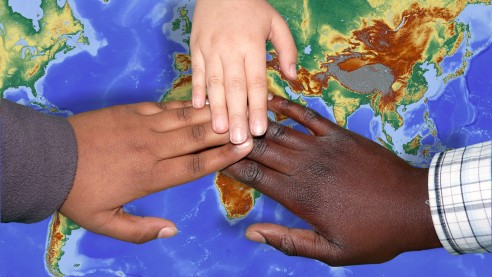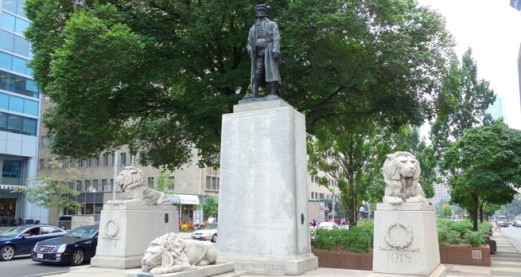In July 2018, The Open University worked in partnership with IF: Milton Keynes International Festival to commission Australian theatre company Back to Back Theatre to bring its successful performance residency, The Democratic Set, to Milton Keynes. Back to Back Theatre worked collaboratively with local participants to create a film portrait of the city, which first screened at the Festival on 27 July 2018.
Back to Back Theatre
One of Australia’s most successful arts organisations, Back to Back Theatre’s work is driven by the belief that all people are, in principle, equal and should enjoy equal social, political and economic rights and opportunities. At the heart of the organisation is an ensemble of professional actors, some of whom have learning disabilities. In addition to producing award-winning live theatre shows that tour internationally, the company also develops experimental residency models that promote collaboration between artists and host communities. Their distinctive approach and ethos has been the focus of previous academic research.
The Democratic Set
Originally devised and designed by Artistic Director Bruce Gladwin, The Democratic Set is one of those residency models. It is an approach to creating short films and performances that, when edited together, capture a unique picture of a community at a particular moment in time. Using a custom-made film set – a neutral room with two opposing doors – The Democratic Set is also a physical space to be pushed, extended or manipulated, with each participant having full control over what they do with, or on the set.
Back to Back Theatre describes their work as being about collaboration rather than facilitation. The process of working with local people during the period of the residency and giving them the opportunity to explore and express their ideas is as important as the film that is created.
The Democratic Set MK
The Stables, the charity that produces IF: Milton Keynes International Festival, managed the delivery of the Democratic Set in Milton Keynes for The Open University, working with Ursula White of Independent Cinema Milton Keynes (ICMK) to engage the widest possible range of local participants though a community liaison programme.
An open call was made to recruit participants from a wide range of ages and backgrounds, with 30 groups responding and 131 people from across Milton Keynes taking part in the residency. 23% of participants self-identified as being of Black, Asian or Minority Ethnic (BAME) background, reflecting local demographic statistics.
The 2011 census reports that people of BAME origin made up 26% of the population of the Borough of Milton Keynes and 18.5% of people living here were born outside of the UK.
In addition to those recruited by Ursula, Milton Keynes residents who were walking through centre:mk on the days of the filming were also invited to take part, adding to the diversity of participants. Participants were given the freedom to express themselves as they wished on set, so were not ‘directed’. However, the project was framed by the question of ‘home’, and the meanings of home in a fast-paced, globalised world, and aimed to showcase the diverse individuals and communities that make Milton Keynes their home.
Those who call Milton Keynes their home
The 2011 census reports that people of BAME origin (those identifying as an ethnicity other than White British) made up 26% of the population of the Borough of Milton Keynes and 18.5% of people living here were born outside of the UK. These figures are likely to have increased since 2011 as the local population is estimated to have grown by more than 5% since then. What is more, large technology companies from both India and China have opened UK bases in the city that have attracted workers from overseas.
The diversity of participants, and the variety of ways in they made the Democratic Set their ‘home’, inspired us to think about the meaning of home in a fast-paced, globalised world.
- What does it mean to have, to create, to be, or to feel at home?
- What makes different communities and individuals – migrants, refugees, minorities, the differently abled, the young, the old, those with and without physical homes – feel or be at home?
- How do we dwell, inhabit, or create a home in a world of instability, inequality and flux? How do make homes an era of migration? Can one be at home whilst on the move?
Milton Keynes is a relatively new settlement, created in 1967 as part of the third wave of ‘new towns’ that were established in the UK following the New Towns Act 1946 to house overspill from the post-war growth of larger cities. It is a place of migration and settlement. Milton Keynes is currently home to over quarter of a million people (with 248,800 residents recorded in the 2011 census, compared with only 53,000 living in the same geographical area in 1961). Milton Keynes is thus largely made up of people who have actively chosen to make the city their home. Does this have a bearing on how local people think about or express the idea of home?

Milton Keynes is the fastest growing city economy it the UK, with local housing expected to grow by a further 20% by 2026. Yet it has an acute homelessness crisis. A recent Shelter report cited Milton Keynes as the 30th worst Local Authority in England, with an estimated 2,358 people in temporary accommodation and a further 38 sleeping rough. This fundamental inequality – of having or not having a physical home – was temporarily levelled on the Democratic Set, with homeless residents of Milton Keynes expressing themselves alongside other communities. It prompted us to ask some of the following questions:
- Is having a home the same as being or feeling at home?
- Is having a physical home a sufficient condition of feeling at home? Is it a necessary condition?
Local people and institutions often refer to Milton Keynes as a city, even though it isn’t technically designated as such.
The film
Before watching the film, take a few moments to think about what you expect to see in this portrait of a community. Afterwards watch the film and reflect on the questions below.
Created by Australian company Back to Back Theatre, The Democratic Set MK was commissioned by The Open University for IF: Milton Keynes International Festival 2018 and produced by The Stables with Independent Cinema Milton Keynes. The residency received funding from the National Lottery through Arts Council England.
Do you think the film might differ if it were made in the place that you call home? If so, how?
You may want to visit Back to Back’s website to see other iterations of The Democratic Set from around the world.
What does your home mean to you?
Think back to some of the questions we’ve previously asked:
- What does it mean to have, to create, to be, or to feel at home?
- What makes different communities and individuals – migrants, refugees, minorities, the differently abled, the young, the old, those with and without physical homes – feel or be at home?
- How do we dwell, inhabit, or create a home in a world of instability, inequality and flux? How do make homes an era of migration? Can one be at home whilst on the move?
These were some of the questions we discussed as part of an Open Forum that coincided with the Democratic Set MK’s premier at IF: Milton Keynes International Festival.
"I don’t really have anywhere that I feel at home"
Here is some of responses participants had to say about their own perceptions of home – including how family, music, and the digital images that they carry in their pockets make them feel ‘at home’:
“My family is where my home is and also I think the language and the accent for me means home because it's so distinctive wherever you go.”
“When we were first married we lived in five houses in about four years. We had one big rug, very little else, but wherever we went, when that rug went down it was home.”
“When all the things that matter are digitally stored, how do we keep our digital home safe?”
“That’s the thing about being from lots of different places is that I don’t really have anywhere that I feel at home, even where I live I don’t really feel is my home, but that’s okay because it means that I can make my home anywhere.”
“Home is not bricks and mortar is it? Actually, when I go to my house, I don’t like being there.”
“It’s not that it’s necessarily that house that is home, and it does feel like home, but I think it feels like home because I have so much memory entwined in that space. It’s your memories, no one else’s, you are the embodiment of your home.”








Rate and Review
Rate this article
Review this article
Log into OpenLearn to leave reviews and join in the conversation.
Article reviews